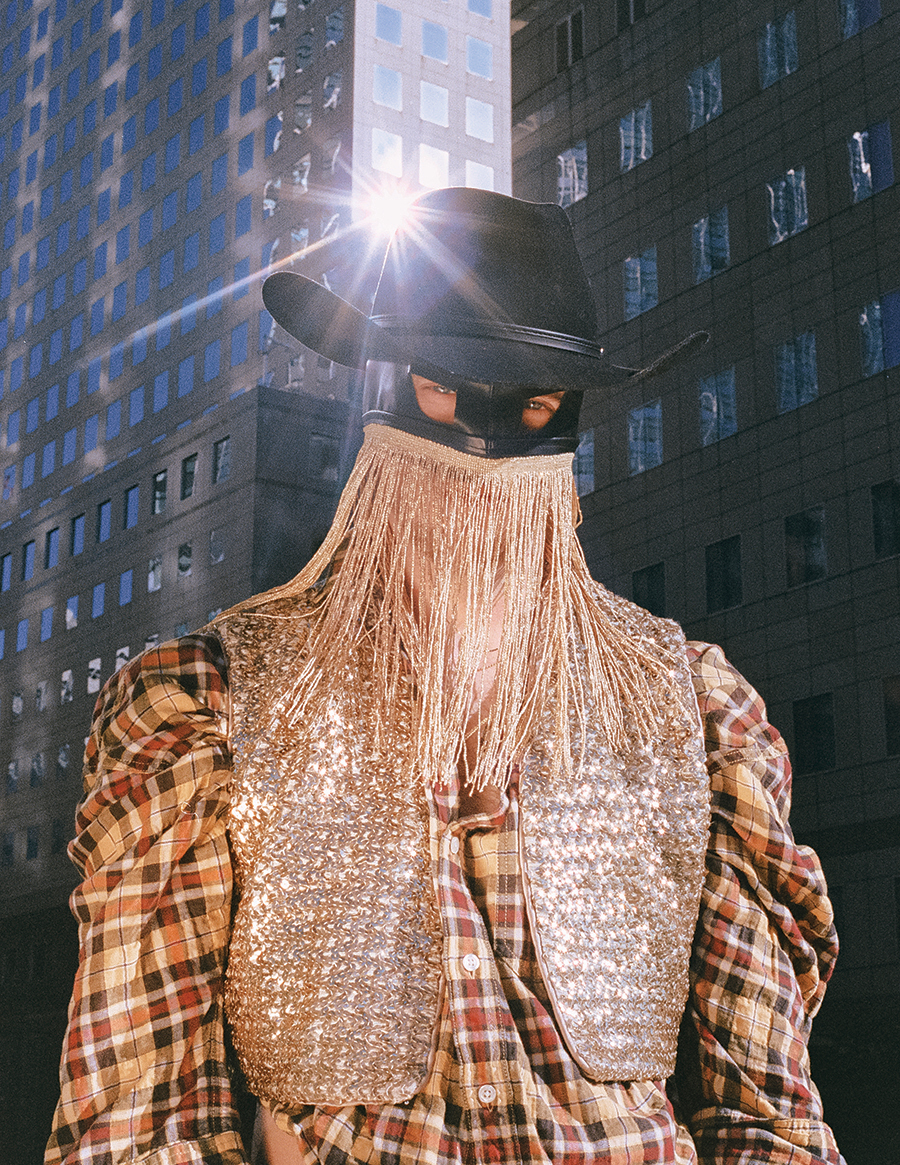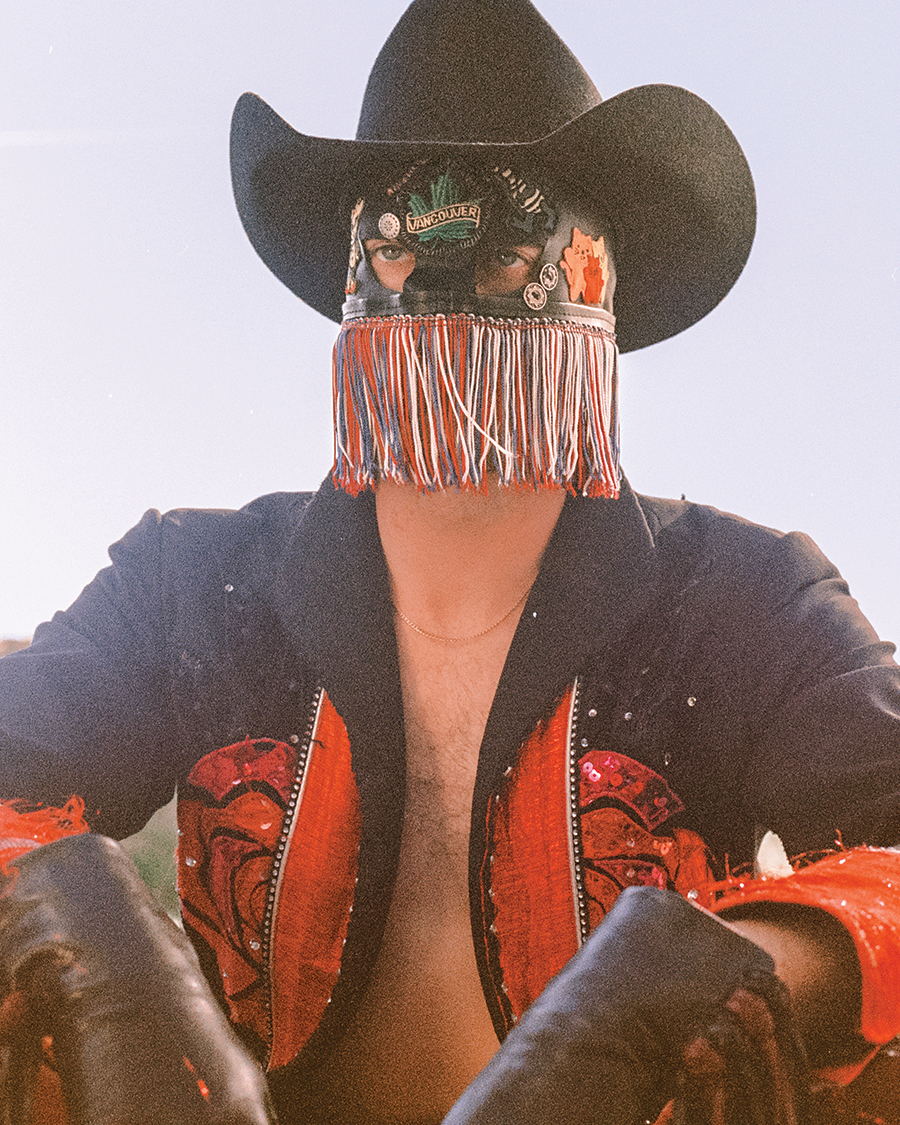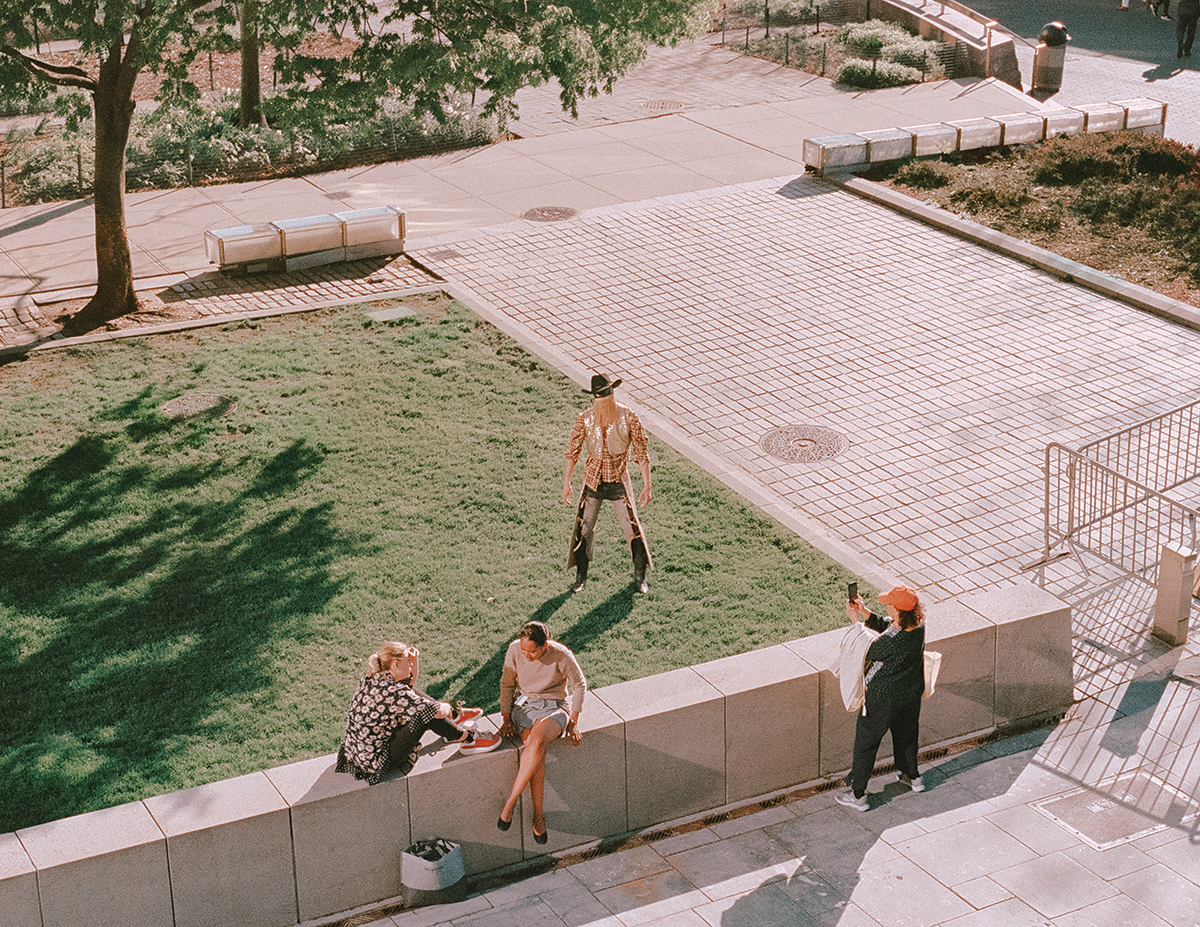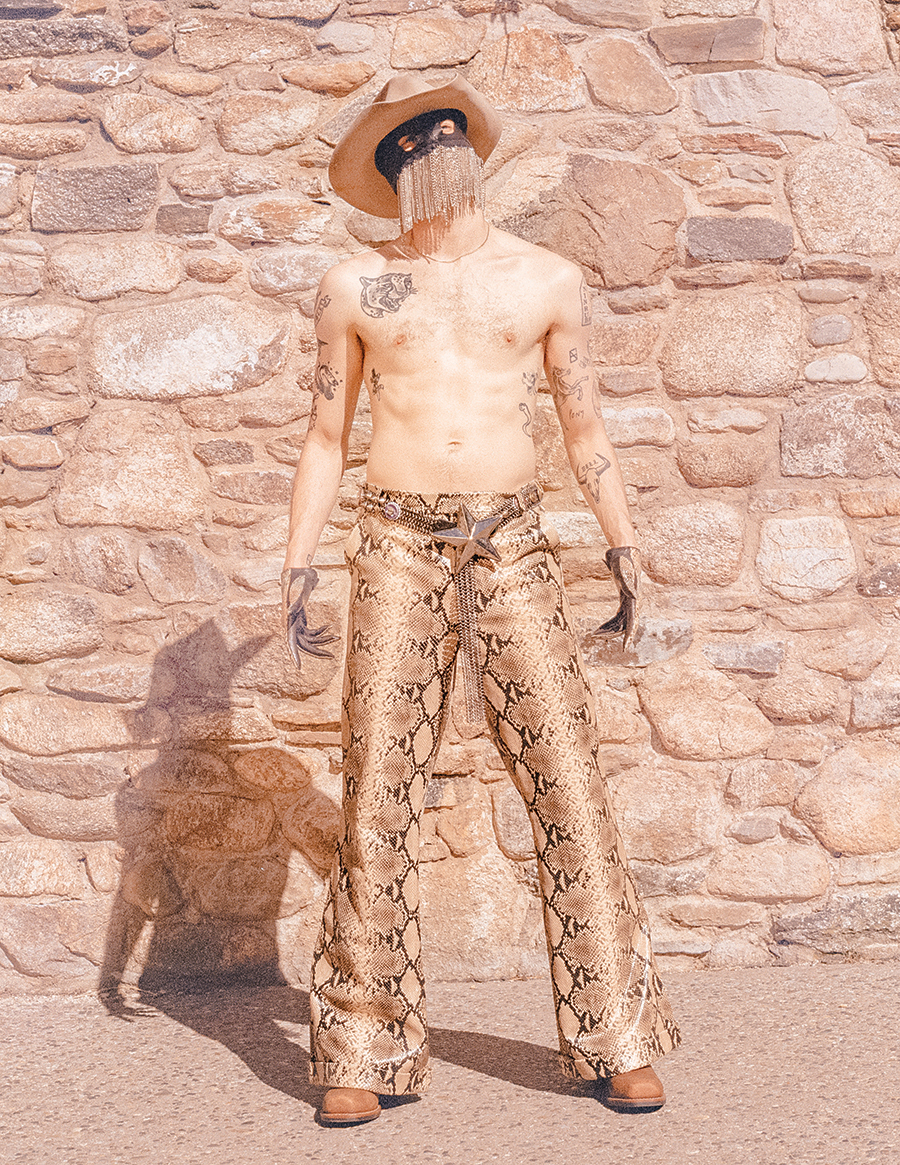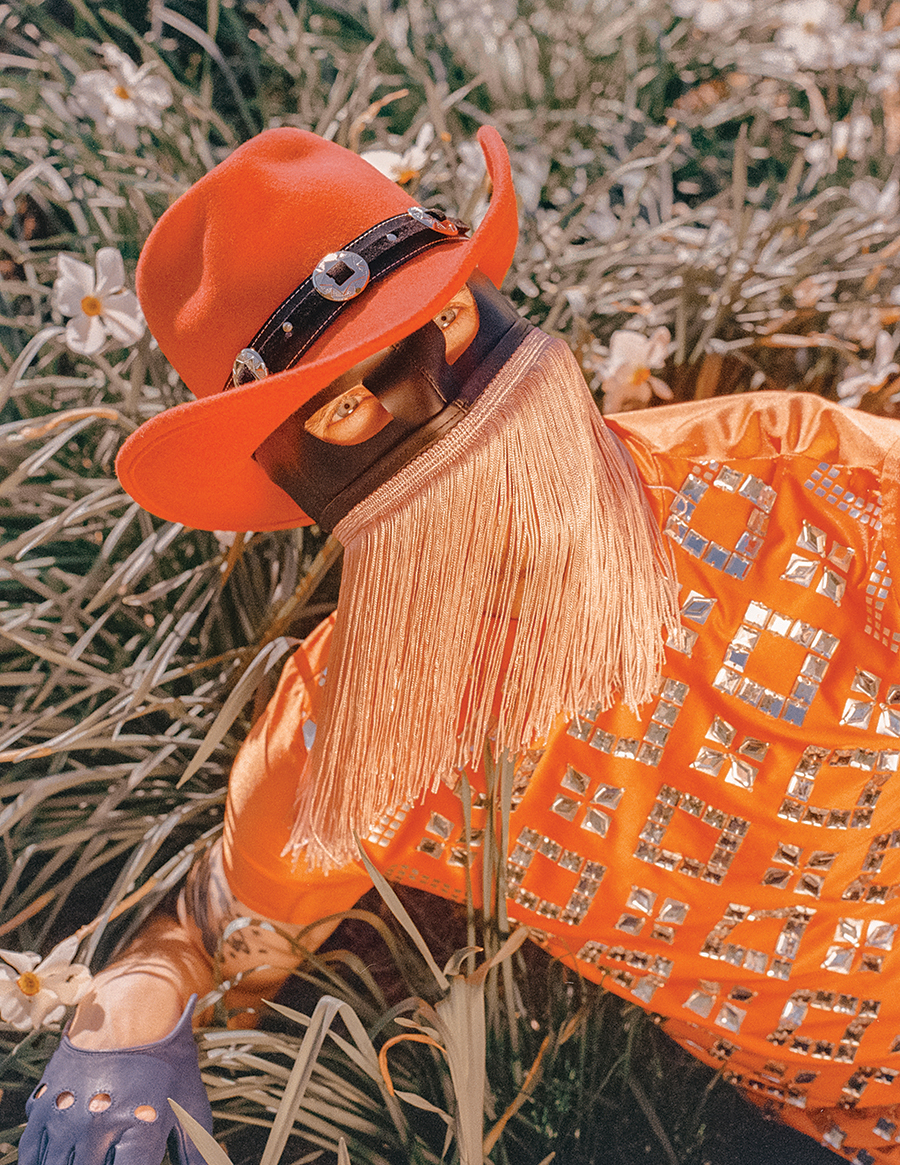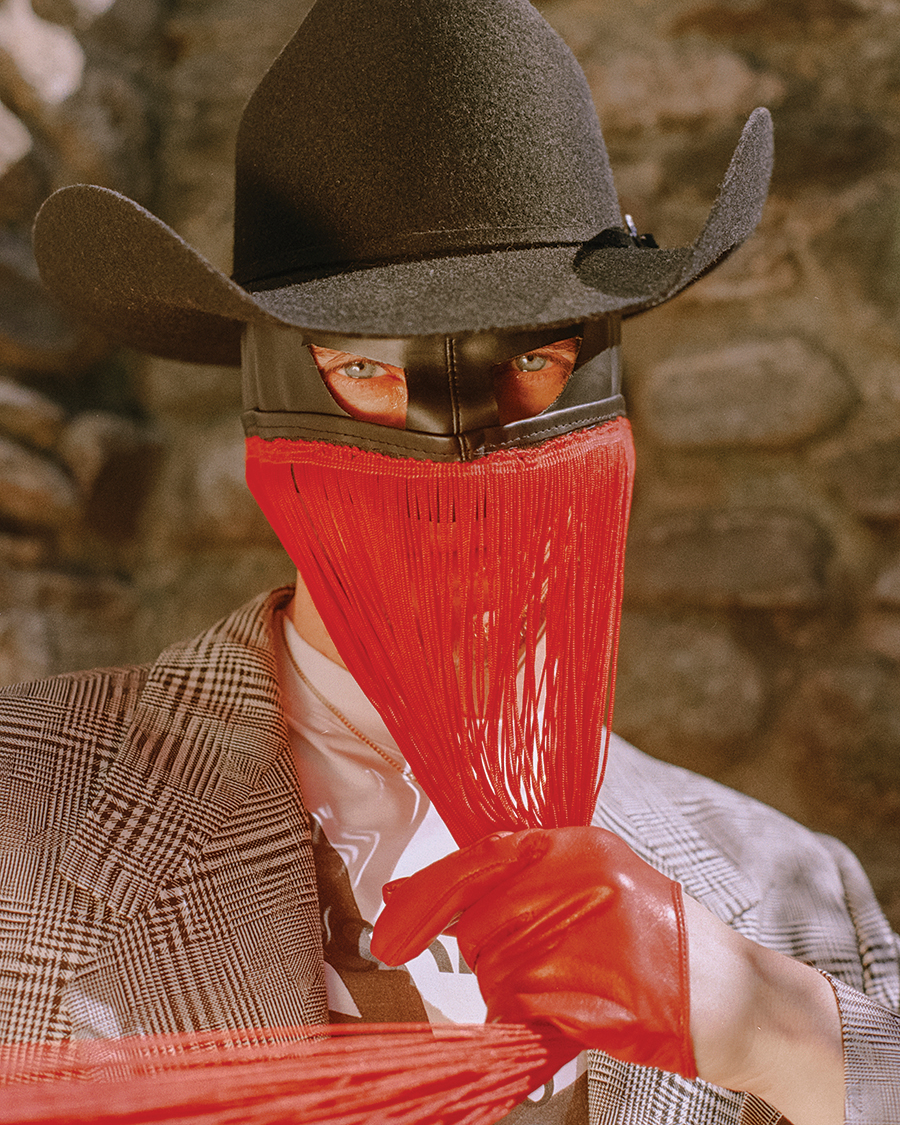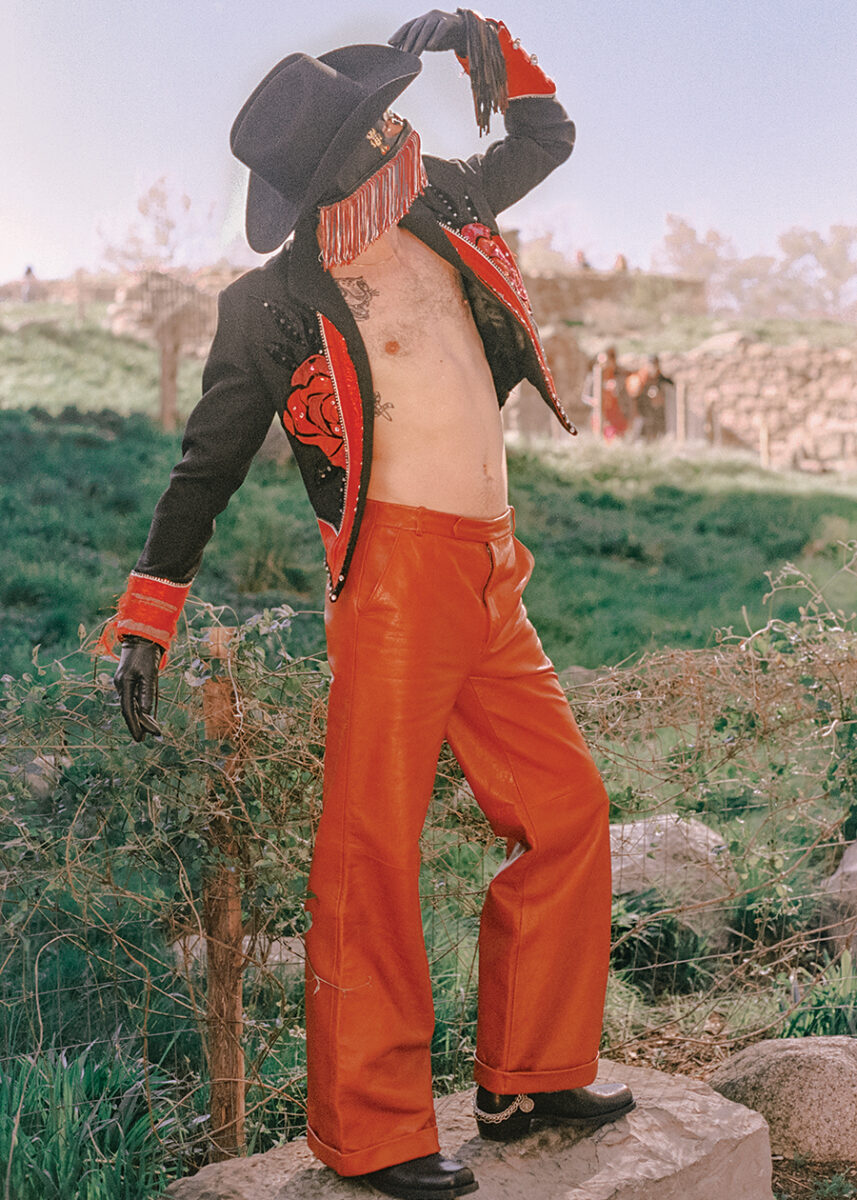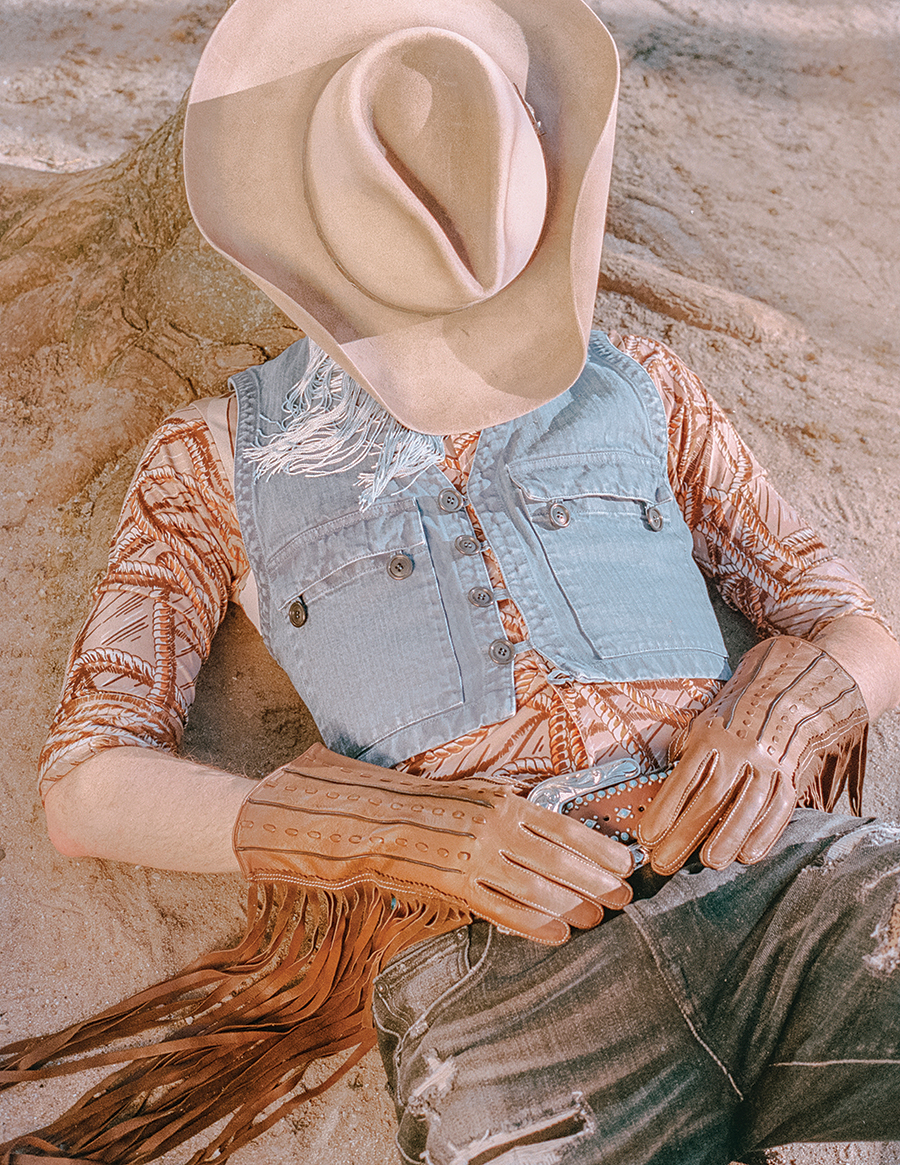CONNOR JESSUP STAR OF NETFLIX’S LOCKE & KEY
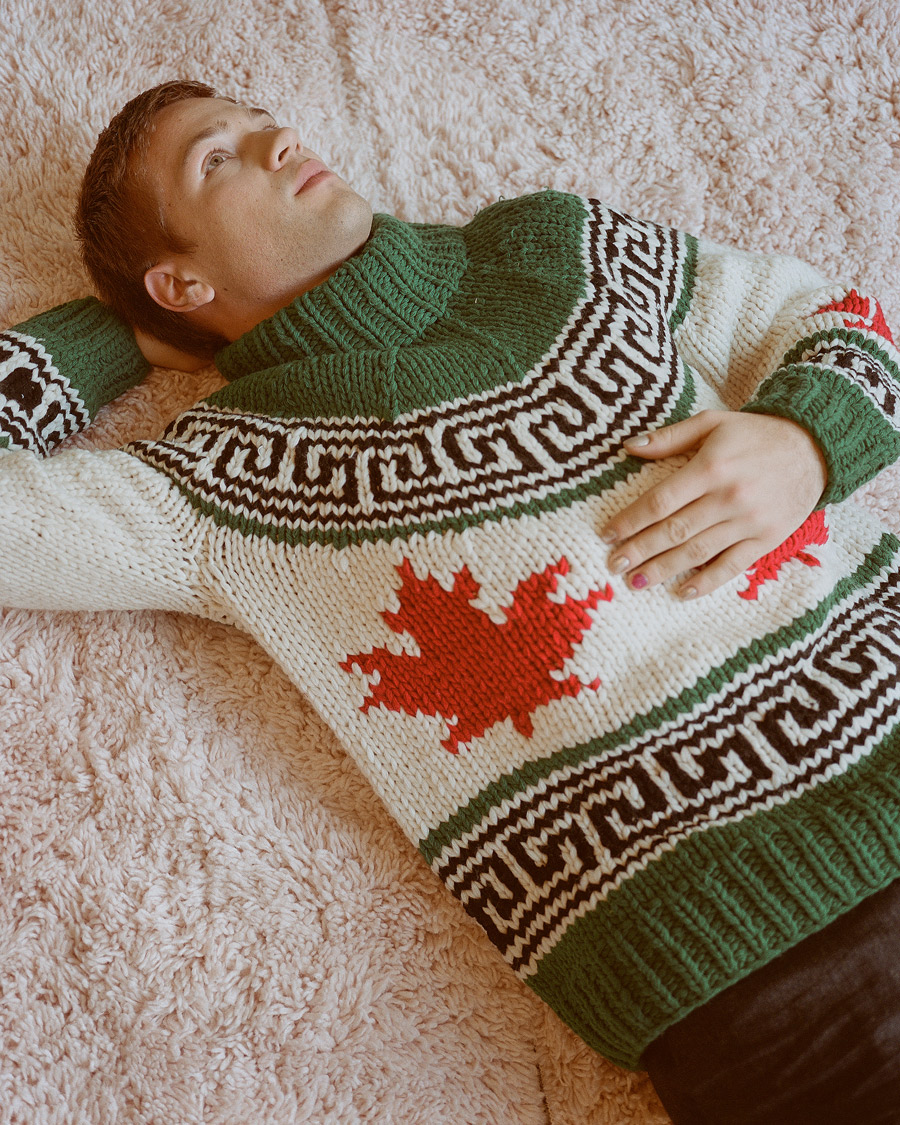
Sweater and Pants: DSQUARED2, Shoes: Prada
Photographer: Emma Craft
Stylist/Interview: Angel Emmanuel
Groomer: Ellen Guhin via Canvas Agency
Set Designer: Lidia Moore
Set Design Assistant: Tess Donlevie
The fans are loving the supernatural fantasy drama, Locke & Key, which premiered its second season on Netflix this October. The show’s success has kept the series in the top ten on the platforms ratings list and has already prompted the creators to move forward with season three. The show has also garnered a few notable new fans including one Britney Spears, who earlier this week prompted her instagram fans to watch the show in typical Britney fashion “Holy crap you guys, gotta check out Locke & Key…it’s pretty good!!!”
Playing Tyler Locke, the eldest of the Locke siblings is; Actor, Director, Writer, Avid Reader, Heartthrob, Globetrotter, and recent guest judge on Canada’s Drag Race, Connor Jessup. We sat down with Jessup over Zoom to talk about why he’s “straight4pay”, RuPaul’s Drag Race, how his accessibility through social media has influenced his queer experience, and how secluding himself in a cottage for a month in the British countryside is influencing his upcoming projects.
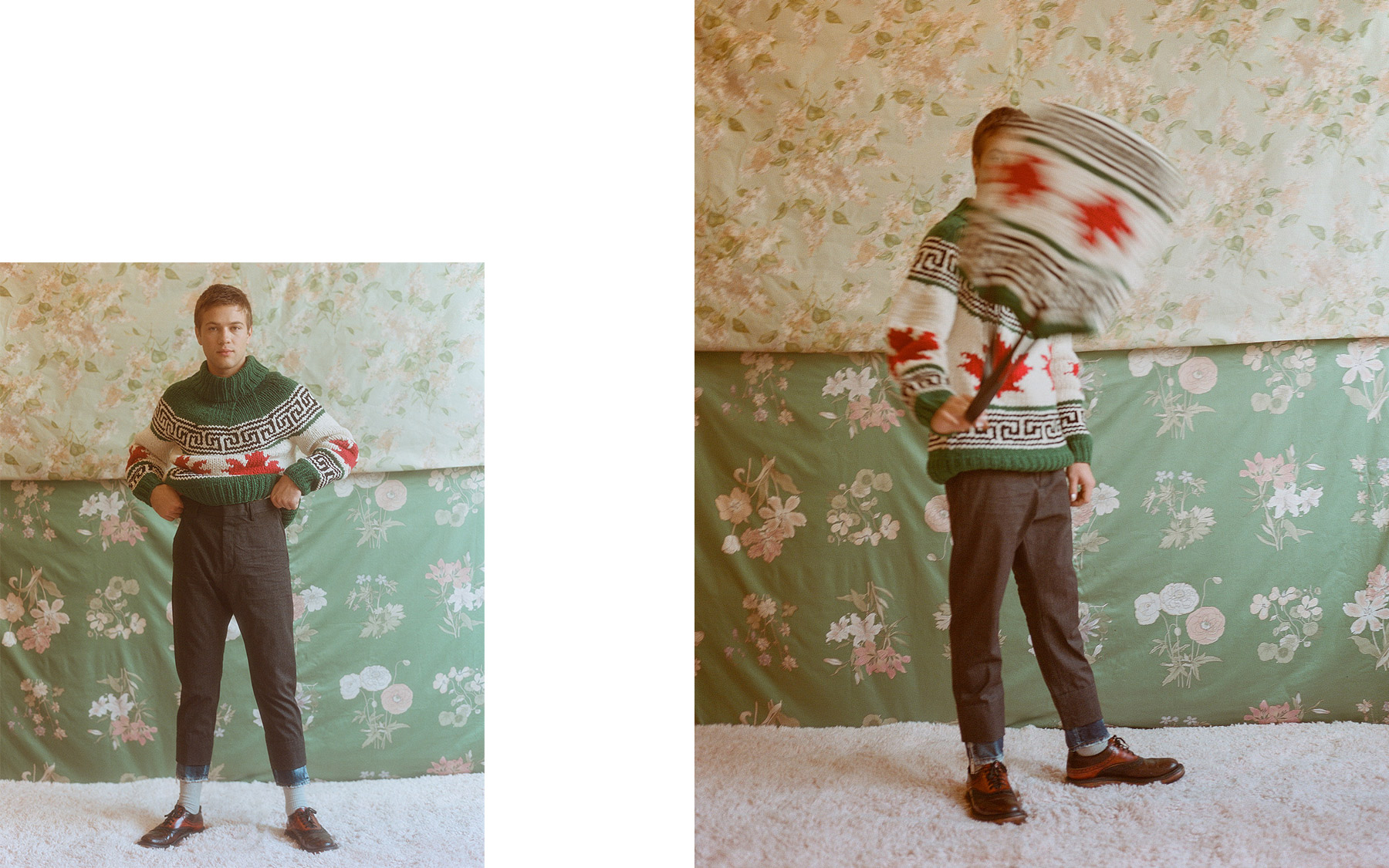
Sweater and Pants: DSQUARED2, Shoes: Prada
Nice to see you again!! Congratulations on the new season of Locke & Key!!
CJ: Thank you!
You’ve now filmed three seasons of Locke & Key, with the third being filmed back to back simultaneously with the second. Having played Tyler Locke for three seasons, is it hard for you to separate yourself from a character that you’ve put a lot of time into?
CJ: No, I’ve never had that. Maybe it’s where I’m at in my career or the characters that I play. I’ve never felt followed by a character. The reality of shooting something is so mechanical; you shoot in many little pieces, you shoot out of order, a hundred people are standing around you. You’ve got a 10 hour, 12 hour workday and spend about 40 minutes at most actually shooting. So it’s never been hard for me to remember that, that’s work. Maybe if I was playing a character that was more radically different than I am, I haven’t really had that experience though.
The sets and visual effects were amazing this season! I loved the Spider scene from episode 3, “Small World”, also the small antique toy house was very cool. Did you have any favorite visual heavy scenes that you filmed?
CJ: Yeah that was an amazing prop. The spider one was probably the most fun I had. We had great fun at the end, there’s a scene where Kinsey, my sister, carries me through the air with her angel wings that she’s found, which involved me and Emilia (Jones), flying on wires for days at a time which was almost like working at a theme park, it was so much fun. There was a scene where we’re making a key, there’s a montage of us forging a key, so they needed lots and lots of little bits and pieces. No one there had any idea how to forge anything, so we literally just made shit up. I’m sure the blacksmithing community is furious! That was fun, in a way it felt like when you’re a kid and you go on a boat and you pretend to know how to sail it, and you do all sorts of random stuff, like pulling ropes but none of it has any actual connection to the reality of how to properly sail a boat, so it felt like that.
A couple of days after our shoot you went to Greece by yourself for two weeks with no plan on what to do. How was your trip, what did you do?
CJ: It was extremely lovely, I did mostly very touristy things! I wandered around Athens, I saw very old things. I ate a lot of overwhelmingly delicious food. I went to Milos and Santorini. All and all, I had a very quiet, restful and calm time, which is exactly what I was looking for. I had never been to Greece before, so it was fun!
Based on your Instagram stories and highlights, it’s safe to say that you’re an avid reader. During your trip, I saw that you were reading Photocopies by John Berger. Considering you were living in a picturesque moment worth capturing and writing a story about; if you were to write a short snippet about that moment with an accompanying photo, how would it go? What would that photo look like?
CJ: That’s a good question! It’s interesting, I was thinking a lot as I was traveling, about the roles of different types of photos. I had my proper camera with me and my phone of course. I was taking a lot of pictures, because I was in a scenic place and also I was alone which helps. It’s funny what you feel compelled to take a photo of with your iPhone and what you feel compelled to take a photo of with your “proper camera” and how the perspective between the two changes. There’s a famous Gertrued Stein quote where she says, “I like a view, but I like to sit with my back turned to it.” I was in Santorini near the end of my trip which is just this stunningly scenic and idyllic place, swarmed with tourists who obviously all feel the same. It’s amazing how quickly you stop looking at “the postcard.” It’s amazing how quickly you tune out the landscape and the beautiful buildings, and the sunsets and the reasons why, ostensibly why, people are there. I feel like it would end up being a photo of a fragment that could almost be anywhere. It could be the pattern of the way a few walls intersect with some light. It’s not anything particularly beautiful but something that catches your eye in that one moment, you can’t repeat it. You can’t exactly put your finger on why it’s striking. That’s why I try to stay open to photography, it makes you look.
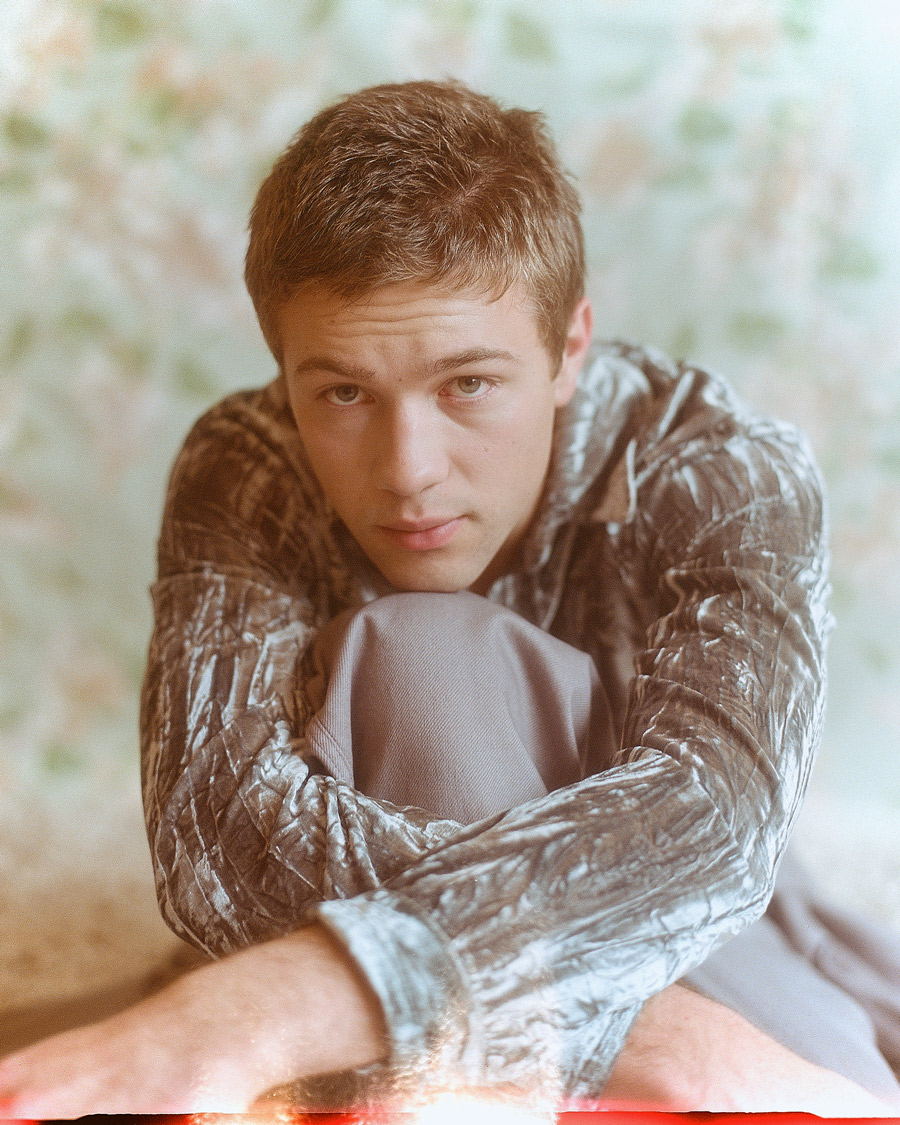
Button up top and Jumpsuit: Martin Asbjørn
Do you consider photography a hobby or something you just enjoy on trips?
CJ: I always chastise myself because I want to do it more often when I’m at home, but I just find that the energy for it is less present when I’m at home than when I’m abroad. Even though what I end up taking pictures of when I’m away is not anything particularly touristy. So I really should start forcing myself to carry my camera everywhere with me when I’m home. I have a very bad memory, and it’s a great way to remember things. Not in the traditional sense of you have a photo of a thing but in deciding to take a photo of something. You remember that moment.
You’re creating your own “photocopy”!
CJ: Exactly! Which is in a way what Photocopies is about. The fascinating thing about that book is that every little snippet, story, fragment, whatever you want to call it, is inspired by a photo. But for the vast majority of the pieces you don’t see the photo. It doesn’t do the thing you expect it to do, like here’s the photo and here’s the story. There’s actually stories where the photos are absent, so it really is like the stories themselves are the photocopies. I think a lot of people with an interest in photography understand that feeling; which is that the photo just becomes a stand-in for some other feeling, or some memory, or some moment.
Anytime I visit a new country I always come back learning so much more about myself than I did before. Did you learn anything new about yourself while there, or London, or now the countryside?
CJ: I’m sure I did, maybe I’m still in the process of that. I’m out here in the countryside in a cottage for about a month. The mission of being here in one place in the quiet for a month is to try and do some writing. So maybe through that process I’ll come to more of a bit of understanding. I always find it takes a second. I felt like I was in such a specific mood for a year while we were working. There’s a certain automatic quality to that, as an actor your life is kind of planned for you while you’re working. I’ve been trying, in the last month since we wrapped and in traveling, to find what my normal speed is again or what my new speed is. I’ve made a lot of new friends in the last little bit. So I’ve been enjoying remembering that friendship can be a great source of energy and inspiration.
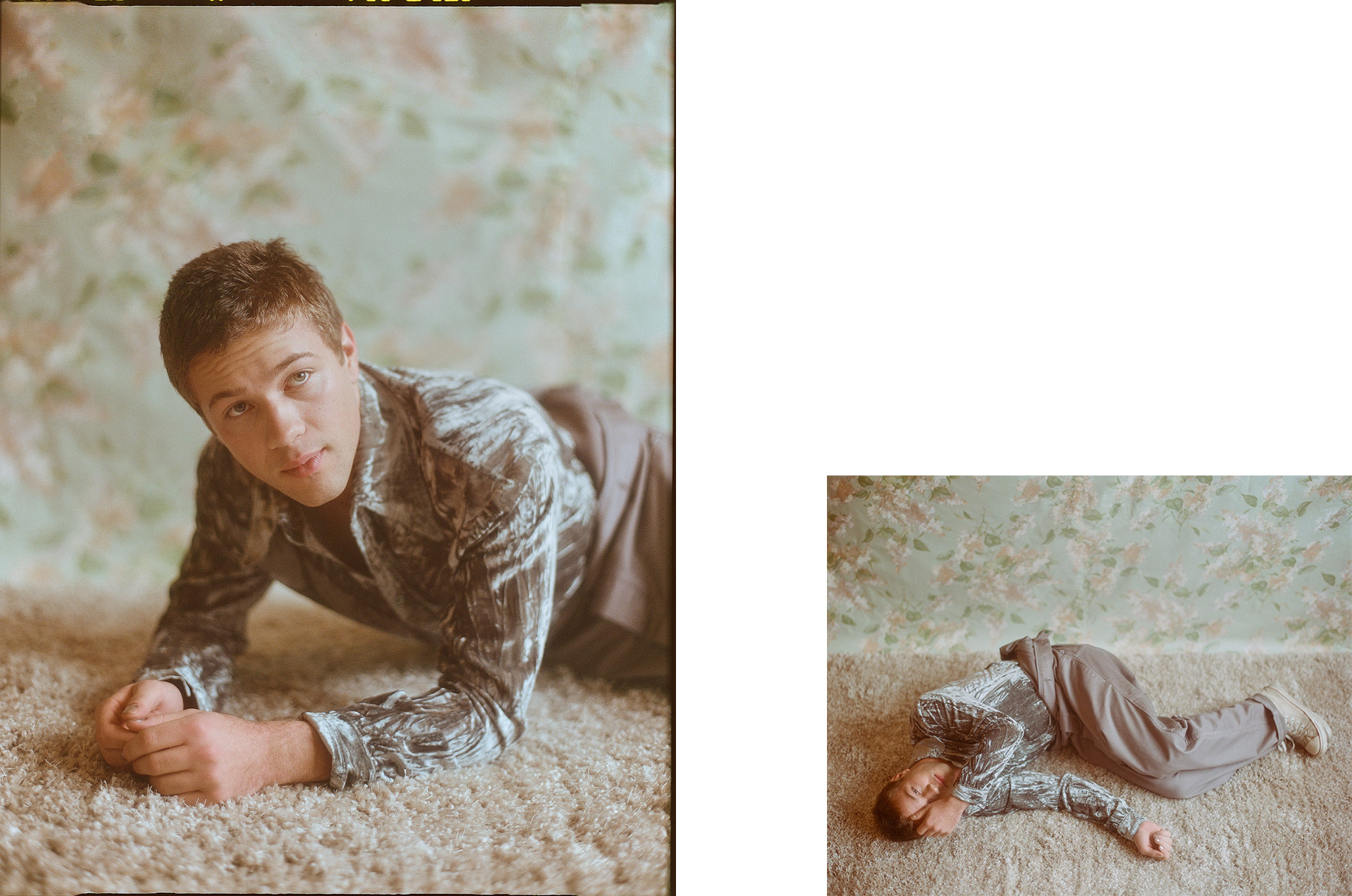
Button up top and Jumpsuit: Martin Asbjørn, Shoes: Converse
Speaking of friendship, during the shoot you showed me a photo of you and Tilda Swinton proudly showing off your manicures. How did that friendship start and when are you going on a Mani/Pedi date?
CJ: Friendship is a strong word, but Tilda is one of these people who is almost supernaturally open to other people and experiences and the world. Which I don’t think is a huge surprise to people who are familiar with her. I’m good friends with this Thai filmmaker, Apichatpong Weerasethakul, who is one of the greats that we have. I made a documentary about him a few years ago as he was on a research trip for his most recent film which just premiered at the Cannes Film Festival starring Tilda Swinton. I visited the shoot a couple of years ago and spent time with them, that’s how I got to know Tilda a little bit. I saw her again in New York a few weeks ago because the film premiered at the New York Film Festival. That’s the Tilda connection. I’m still a little Queer boy, so Tilda is obviously in the pantheon.
So no mani/pedi date set??
CJ: I’ll keep you informed, I sure hope so! We’ll see how that materializes in the real world!
I’m so obsessed with your instagram bio, it’s hilarious! It’s “straight4pay 🏳️🌈” which is a play on words on “gay4pay”. As a queer actor how does one prepare to be a straight man?
CJ: I didn’t do anything to prepare for that!
That’s something!
CJ: I insisted to myself that I was straight for many years while I was young so I have enough experience in knowing that vocabulary. In many ways gay people are great studies of straight behavior, because we’ve tried so hard to understand. I would trust a gay man to describe a straight mans behavior better than I would trust a straight man.
Since coming out, how freeing has it been to be yourself, especially in the industry?
CJ: More than I thought it would be honestly. More freeing than I expected. Coming out is a process, which is a phrase that gets thrown around, but only started to mean something to me recently because I came out many years ago in my private life. There’s such a big build up to that, you know? There’s coming out to your mom, and your best friend, and that felt like the important thing. Then years passed and I had convinced myself that I had come out, and then for various reasons I had decided that I wanted to come out publicly and it’s really only since then which is something that I didn’t put a lot of weight on when I did it, emotionally, that I started to feel a part of the community and connected to a heritage and really started to properly feel gay. I’m still in the process of examining exactly why coming out to people that I don’t know had the effect on me that it did.
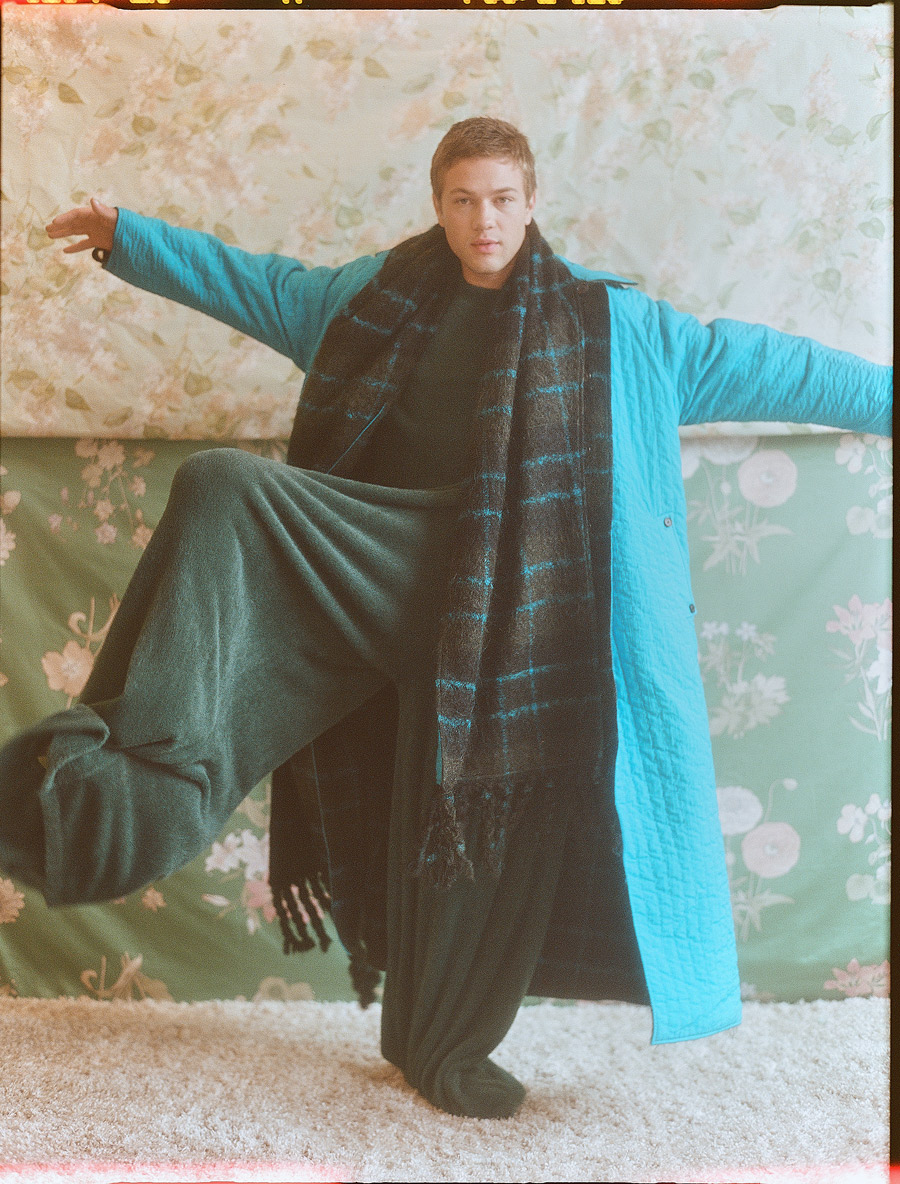
Jumpsuit, Coat, and Scarf: Kenzo
A lot of people shared their stories with you when you publicly came out
CJ: Yeah it was two years ago when I came out on instagram. Most days people will send me messages, stories, some fragments short or long of their experience whether they’re in the closet, or freshly out, or out for decades, or in countries where you can’t come out. There’s such a variety of queer experience and not just gay people but; ace people, trans people, pan people, and others under the wonderful rainbow umbrella. Which I think contributed to me feeling a part of the community, and broadening and deepening my understanding of queerness, because my experience is so limited compared to this whole range of other peoples experiences. I think that has had a big ongoing impact on me. It’s hard to know if I feel shy about the whole thing because I have no claim. I’m just an actor, I have no expertise or training or real wisdom to share or help. It boils down to receiving these stories from people and trying to understand them through the prism of whatever tools I do have. Social media is a weird thing, this flow of information.
Getting all these messages everyday, how does that make you, Connor Jessup the person, feel?
CJ: Depends on the message. Sometimes it makes me feel really warm, and seen. Sometimes it makes me very sad. Sometimes it makes me confused and angry. Really the range of emotions. The type of messages are so varied. It goes from something as simple as someone who sent me a message the other day that just said, “Thank you for coming out. I feel less alone.” That was the whole message. That for some reason, the moment that I read it, had a real emotional impact on me. Even though there’s no information on who that person is or what their experiences are. The hard thing about social media is, which I think we all feel, is that it has a tendency to dehumanize. People are seen faceless. When you’re interacting with celebrities or even when you’re interacting with your friends, it just feels a bit separate from real life. You allow yourself to react in ways where you wouldn’t if you were talking to someone in real life. Even the comments on anything I post I’m like, “I doubt you would say this if I were to bump into you on the street.” So there’s that level of separation and it’s hard and it takes work when you’re sending and receiving to consistently remind yourself that you’re dealing with full people. Anyone sending me messages saying “I feel less alone,” or “I hate my body,” they’re just as full of a person, with just as full lives as I am, as any of us are. I have to remind myself that all the time, that’s a good exercise of mine.
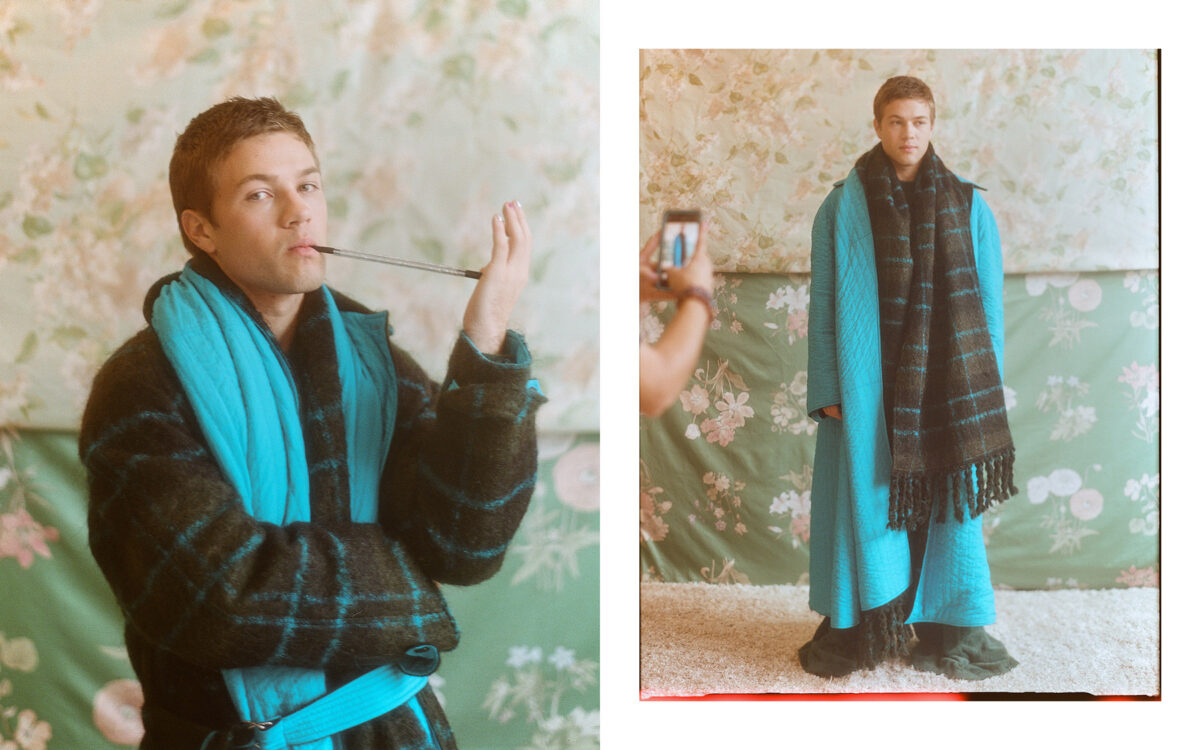
Jumpsuit, Coat, and Scarf: Kenzo
This week you’ll be on Canada’s Drag Race as a guest judge! How excited are you to see the episode?
CJ: I’m very excited! I’m a little nervous, obviously. I haven’t seen any of it. You shoot for, well I was there for 10 hours shooting for what will probably be 15 minutes of the show. So I don’t know or have no concept of what they included, what they didn’t include, how they edited it. I’m excited, nervous, and I hope that the gays don’t turn against me!
The Drag Race fandom is notable for voicing their opinions! Good or Bad.
CJ: Yes! And so far I have yet to be on the receiving end of any gay backlash
Good! Let’s keep it that way!
CJ: Yeah exactly! I hope that this is not the first time
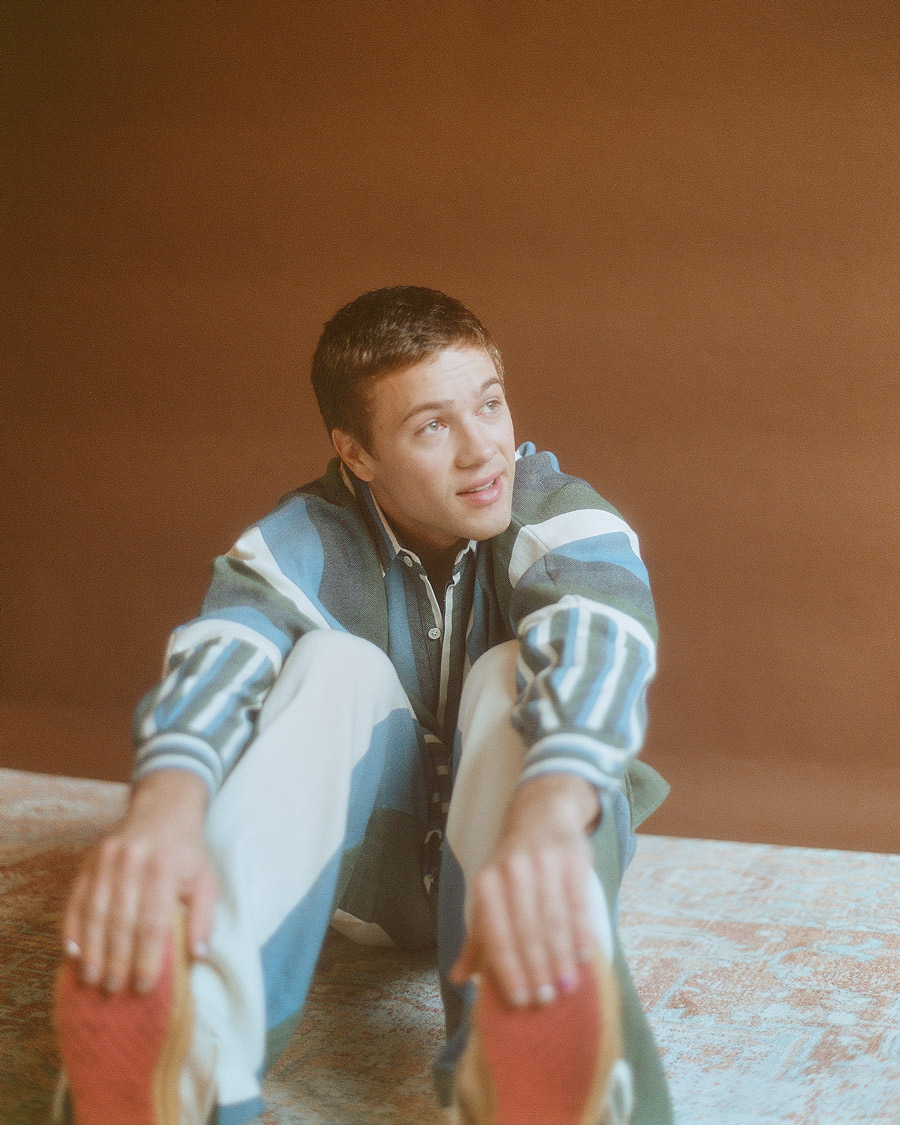
Shirt and Pants: Marrakshi Life, Shoes: Superga
The preview for the episode shows that it’ll be Snatch Game (a challenge where the queens have to do celebrity impersonations following the Match Game show format) which is the most beloved challenge of all time! What was that experience like not only getting to judge Drag Race but also the Snatch Game episode?
CJ: The way the episode went; there was a different guest on the actual Snatch Game but I was on the main stage. It was a scheduling thing, but I was actually there since it all happened on the same day. I was there in the morning and I watched the whole thing live. It was a great way for me to get acquainted with the queens. It’s episode 4 of the season so everyone watching will have seen 3 episodes worth of getting to know the queens, and I came in blind, so it’s a great introduction. It’s also so fascinating as a fan of Drag Race to see how unbelievably hard Snatch Game actually is. It seems hard when you watch it on the show but when you see how dry and slow and hot the actual shooting is. There’s no energy at all, there’s no flow, so to be witty and sharp and quick in that environment is impressive.
Have you watched Drag Race for a while, are you a fan?
CJ: Yeah I am, of course! I mean now though everyone is a fan. It’s relatively new to me though, I’ve watched it for about two years now.
Do you have a favorite queen from any of the Drag Race franchises?
CJ: I don’t think I have one favorite. Last season I was really bummed by the way things ended for GottMik, I was a huge GottMik fan. There are many queens I love, but they’re one of them
What was it about GottMik that you loved?
CJ: They’re enormously talented and fun! What GottMik represents; which I saw a little bit of when I was guest judging, is the broadening of what the definition of drag is. I’m not at all an expert in drag, but it seems from an outsider’s perspective that people like GottMik are leading the excavation of new territory, new ideas, new permissions, and that’s really exciting to watch
Would you ever do drag?
CJ: I would love to try! Now I have people around me that I can call, like makeup artists, that could help me. So I would absolutely love to try! I feel like I could probably make it work.
Oh you’ve got it! For sure!
CJ: Thank you! I don’t know what my style would be at all, I have no sense of that. I would like to explore.
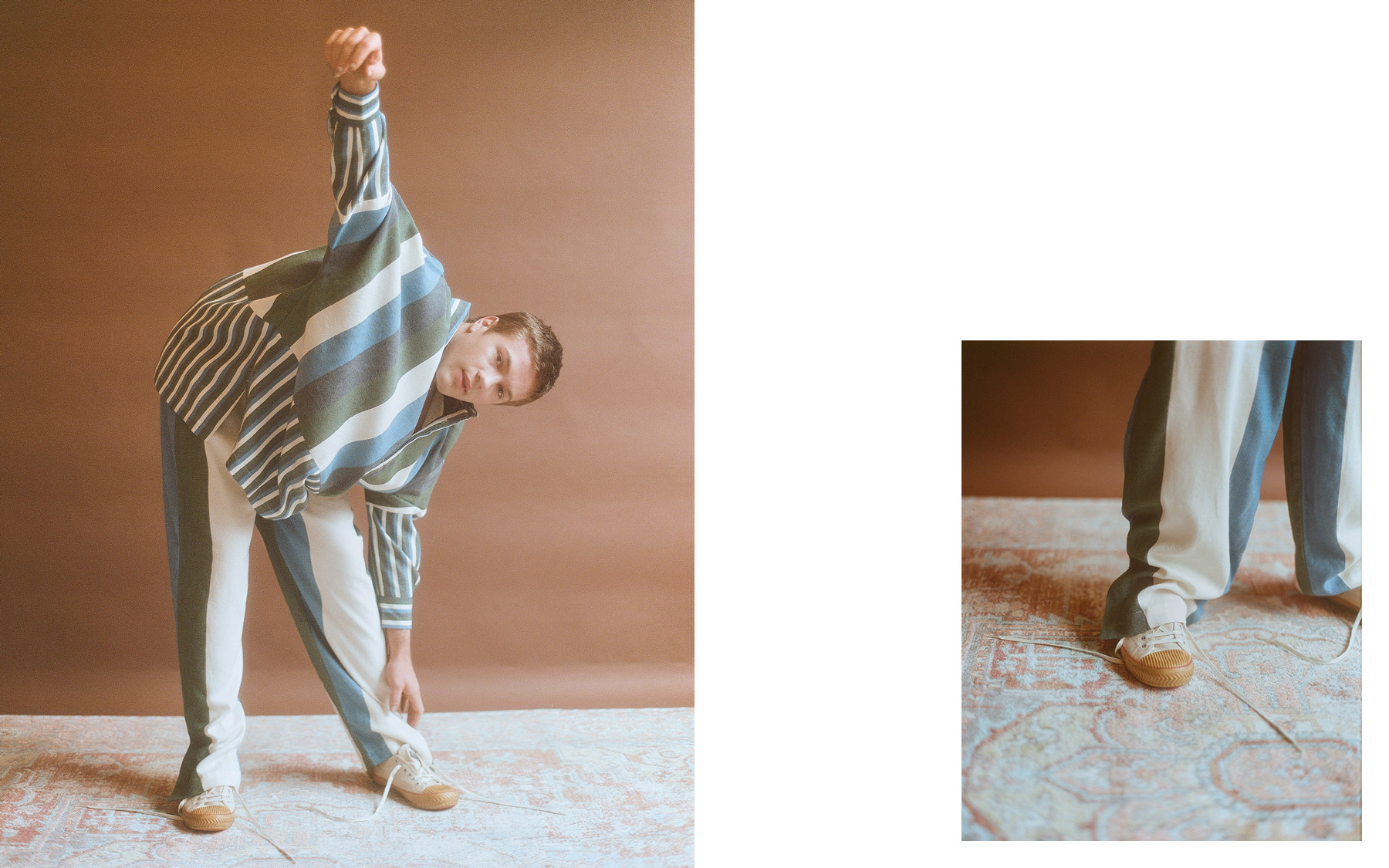
Shirt and Pants: Marrakshi Life, Shoes: Superga
Do you have a sense of style now?
CJ: In my life? It depends on who you ask!
Well if I’m asking Connor!
CJ: I’d like to think so! Maybe it’s connected to coming out, the timelines would suggest, it’s only in the last couple of years I started to really have fun with clothes and started to care about them in a way as a form of expression at all. I’m relatively late to that idea. I had a lot of ideas when I was younger, which is partially connected to sexuality and partially other aspects of my personality, about certain levels of seriousness. I wanted to be taken seriously, and I think it’s also a symptom of being a child actor and growing up around professionals and adults. I always wanted to be seen as mature, and classy, and simple so the clothing I had reflected that. In other words, you could say, it’s boring. So it’s only in the last couple of years that I started to branch out. I don’t know how I would describe my style though.
Who are some designers that you like?
CJ: I’m obsessed with Bode, and J.W. Anderson. I’m no fashionista at all but it is something I’ve given more time, money and attention to! Hopefully I can find ways to surprise myself!
Besides acting, you’re also a director. Where would you like to take your directing career?
CJ: Forward, ideally! I’ve made shorts, documentaries, music videos and I’ve kind of tired myself of making short form stuff. I definitely want to make the next inevitable step and make a feature, which I’m working on literally right now. Hopefully in the next few years I can get a feature off the ground.
If there was nothing holding you back from making your larger than life film, what would that dream project be?
CJ: The film I’m working on right now, if it can pan out like it is in my head, that would be the immediate dream project. Last year I read The Song of Achilles by Madeline Miller, which is a beautiful, beautiful, queer retelling of the Iliad, which is a massive story on a huge canvas. I’d love to do something like that.
What kind of stories do you hope to share?
CJ: I don’t think there’s one descriptor, or one type of story. To me directing and writing is a way of better understanding myself. I find that most of the time what I’m fighting against is the temptation to go through life automatically. Writing and directing is a way of resisting that or forcing myself to resist automatic living. It’s a way of asking myself questions and accepting boredom. The stories I’ve been drawn to tend to be ghost stories, but not in the horror sense. Themes I come back to, that I’m interested in, deal with this relationship between loss and desire. Maybe it’s a queer thing, I mean it’s a human thing. The impulse towards it, the queer thing, this feeling of things you want but they slip away from you or they’re out of reach. Maybe that’s why ghost stories always appealed to me. I expect that to pop up in lots of things I make, but I’m not sure what form that would take.
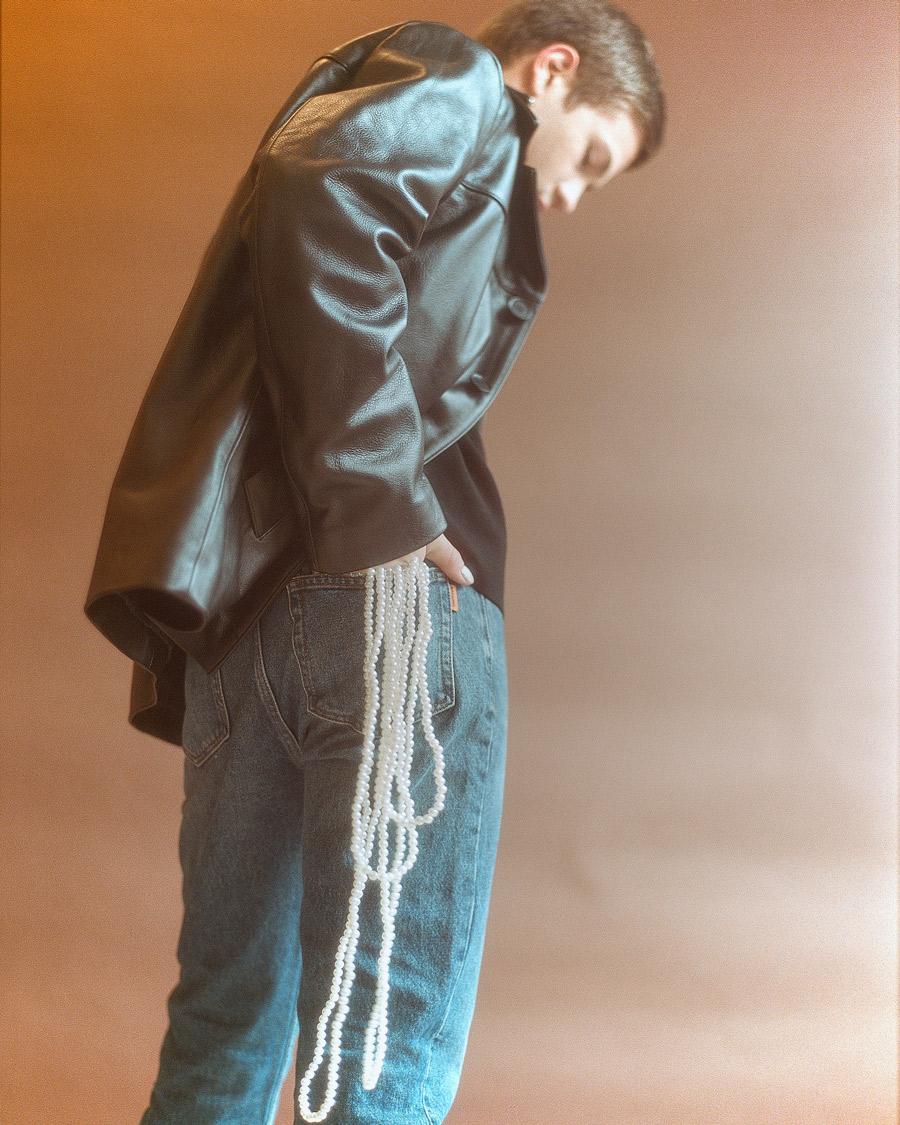
Jacket, Sweater, Jeans: Sandro, Shoes: Prada, Necklaces: Stylists’ own
Would you ever direct and act in the same film?
No.
Why not?
CJ: A lot of reasons, I have a lot of insecurities as an actor, which requires a lot of energy to combat while I’m working, that I don’t think I’d have that energy to give while directing. Part of the exciting thing about being a director, one of the most exciting things, is working with actors and being surprised by actors. You write something, or come up with an idea or stage a scene, and then actors breathe life into it, and you’re surprised, and you have to react, or you didn’t think this scene would play out that way or that line wouldn’t have that impact. I don’t think I could surprise myself in the same way, so I think in a sense it would be robbing me of the fun of being surprised by someone else. Also there’s so many brilliant actors who I’d love to work with, and friends of mine, and people I’ve met, and people who I’ve dreamed of meeting. I know myself, why would I get in the way?
Who are some of those people?
CJ: I have good friends for example, these two young british actors Joe Locke and Sebastian Croft who are two of my dearest friends, and they’re beautiful actors
Also Netflix actors right?
CJ: Yes! They’re in Heartstopper which is coming out next year sometime. Which is gonna be fantastic and they’re gonna be brilliant, and way, way more famous than any of us! So it’s people like that who are not household names but close friends of mine who I’d be very, very excited at the idea of working with. One of the most fun parts of doing anything, whether it’s acting or directing, is making work an extension of friendship. It’s the best way of making fun. All the things that I’ve made that’s been the most fun and satisfying are things that I’ve made with friends, or with people who become friends, where the work and the friendship is almost inseparable. Beyond that I’d love to work with Tilda, there’s more actors on that level that I’d also love to work with. It’s a great world out there of people who can surprise you.
What are your favorite films?
CJ: Oh my god, that’s just a mean question!
Sorry ‘bout it!
CJ: I mean it changes all the time! The movies that I’ve seen the most are; the Taiwanese movie Yi Yi by Edward Yang. Still Walking by Hirokazu Koreeda, which is extremely tender, detailed, I’ve seen that movie hundreds of times. Spirited Away by Hayao Miyazaki which is the most beautiful movie ever made. You know what movie I’ve been watching a lot recently is, A Sunday in the Country, a French movie from the 80’s, by Bertrand Tavernier. It’s a beautiful movie. That’s the movie where the first time you watch it, it seems very nice but doesn’t hit you over the head, but as you think about it more, it kind of expands inside you. I’m especially interested in and moved by how the camera moves in that movie. I’ve never seen a camera move like that, it’s like it’s powered by wind and not by grips. My friends and I went to go see a screening of, In the Mood for Love, a Wong Kar-wai movie last week, which I’ve seen a few times and always loved but for some reason this time watching it in theatres with other people at this point in my life, it overwhelmed me. I was a fucking hysterical mess. It’s strange, this amazing thing about art, that something you feel like you know can completely sneak up on you.
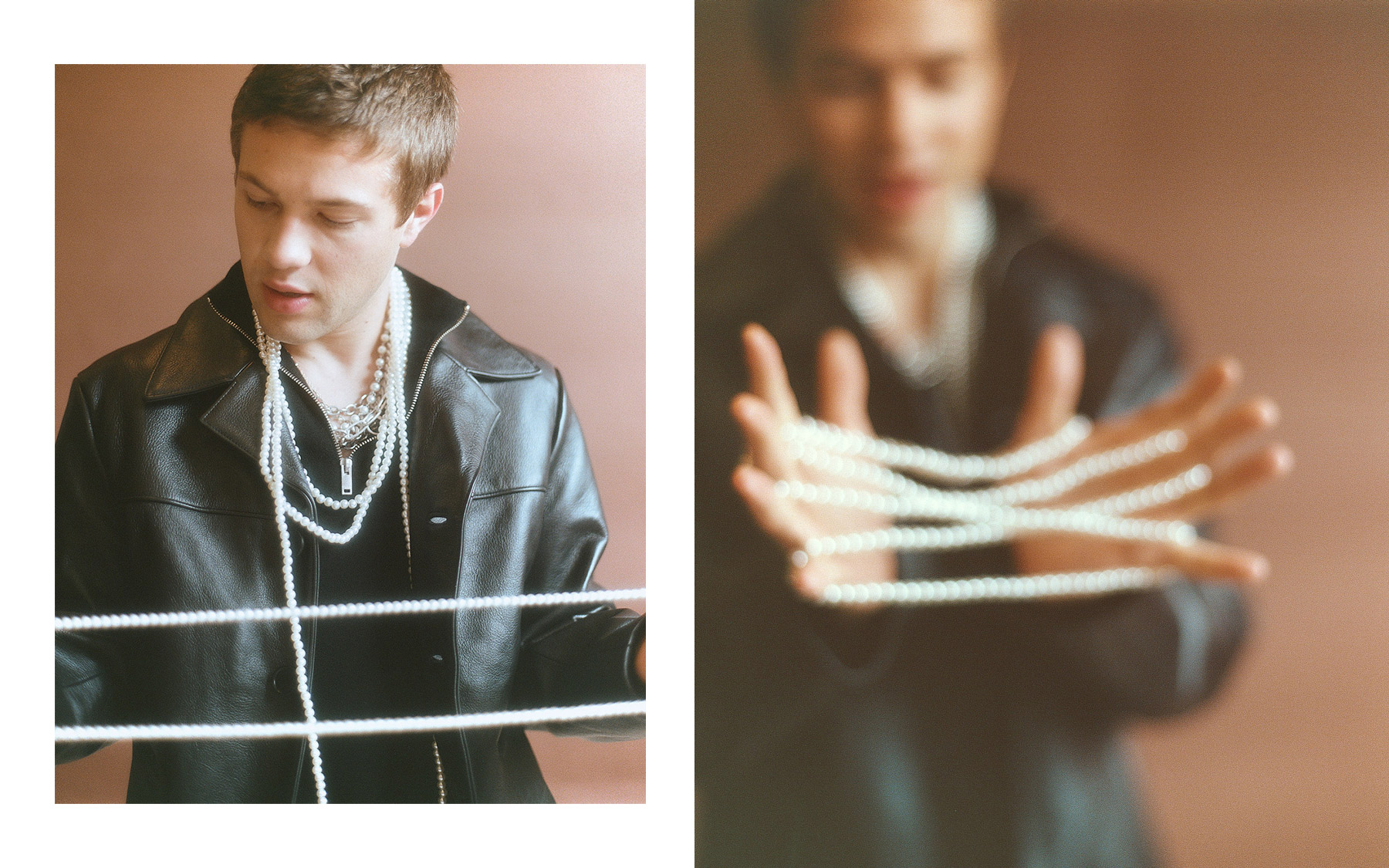
Jacket, Sweater, Jeans: Sandro, Shoes: Prada, Necklaces: Stylists’ own
Are there dream roles that you’d like to one day play?
CJ: I should have a better answer to this question, but I don’t really. I would like to do things that are different from what I’ve done before. I would like to be pushed to do things that I don’t think I can do. Specifically what that looks like, I don’t know. It’s always hard for me. I’m always most comfortable playing characters who are fragile, vulnerable and unsure. It’d be a good healthy challenge for me to play someone who’s really, really confident. I don’t feel like I think that’s at all a tool I have control over; confidence
While in New York, you visited galleries and museums. Were there any galleries, art work or artists that stuck out to you?
CJ: I have this artist friend of mine who I’m obsessed with named, Bambou Gili, who’s a young Brooklyn based painter and she had a show which just ended, called The Nonexistent Night which is a riff on the Italo Calvino title, The Nonexistent Knight. She’s a beautiful, beautiful painter and also an obsessive Hayao Miyazaki fan so we bonded over that. She’s a genius and she’s gonna take the world by storm with these great sensual, figurative paintings. So I love her and was very grateful seeing her first solo show. The only other art I went to see was at The Met, which I’ve been to a few times. It always, at least for me as a non New Yorker, feels like going to a different museum.
It always feels that way!
CJ: I wandered parts of the museum I’d never seen before, there’s so much to see, and a lot of pictures to take on my phone. In the Greek section at The Met there’s this display with small glass beads in the shape of tiny fragile animals which for some reason struck me. It’s one thing for a sword or a marble statue to survive, but the fact that these tiny beads had survived 2400 years really touched me.
Did you see any glass bead animals while you were in Greece?
CJ: Not like that! The thing in Greece is like almost the same thing when you visit anywhere that has such a rich history. In Japan for example they call it “Temple Fatigue,” where you’re so inundated with history and culture that it almost becomes meaningless. Everywhere you look, everyday, you’re seeing something that has 2400 or 3200 years of history. I think the same thing happens in museums, where all these miraculous things are grouped together in such quantity that you kind of lose sight of it. But I did see some beautiful things in Greece.
As a Toronto native, tell me about what the experience was like growing up. How did it influence the person you are today?
CJ: I love Toronto more now than I ever have, I think I grew up and it was my home so I didn’t really think about it, it was just the place I lived. When I was a teenager I thought it was peaceable, but boring…but now I think it’s peaceable and boring!!! The intonations just changed! I’ve come to really value that quality. I have this weird relationship with Toronto where I don’t find it inspiring at all, no part of me is moved to tell Toronto stories, or set stories in Toronto. When I walk down the street I’m not moved by what I see unlike some other places, but I feel a great sense of safety while I’m there and warmth. My whole family’s there, I get to settle in a way where it’s really comforting. There’s an amazing film community, and amazing artists, and young people on the verge of really exciting work, so I feel really excited by them. Toronto is a major metropolitan city with about 5 million people, there’s a lot of layers to Toronto.
Finally, who is Connor Jessup?
CJ: He’s usually not sure. He’s trying to figure that out. Like I said when I was younger it was very important to me to have a clear self image and work on a brand. Not in a careerist way, but in identifying who I am, the way I interacted with the world. I never really questioned that, that it came from an honest place. Now I feel like a lot of the foundation that a lot of that was built on was not quite true. I’m trying to make less assumptions and leave more open space, and be okay with that.
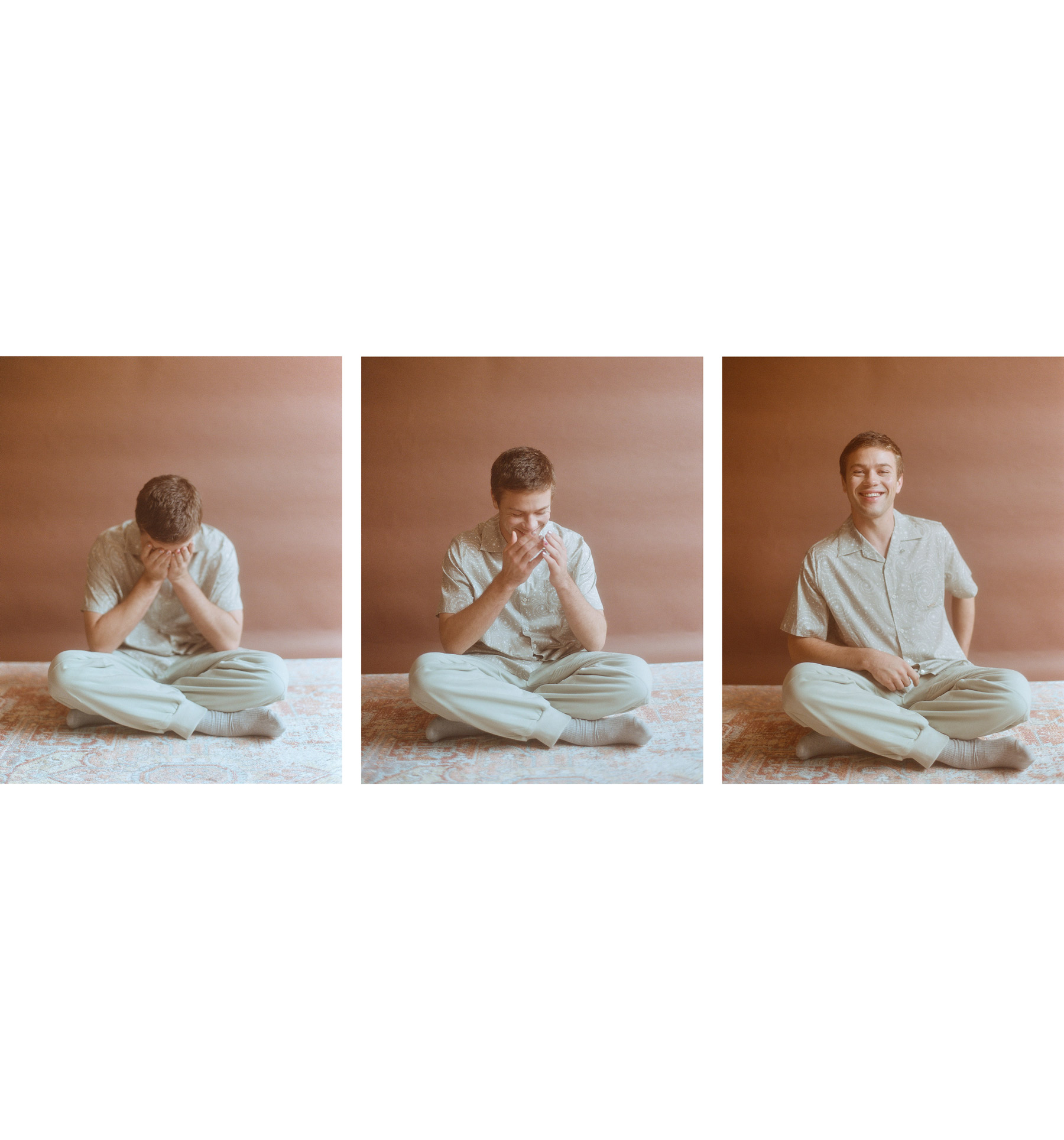
Shirt and Pants: Private Policy

